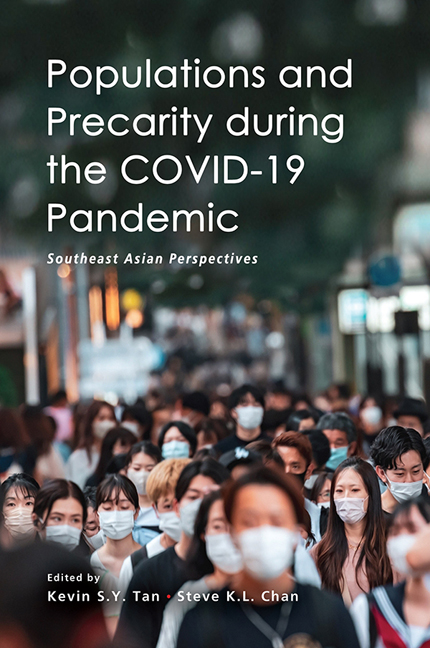Book contents
- Frontmatter
- Contents
- Preface
- About the Contributors
- 1 Introduction: Populations, Precarity and the COVID-19 Pandemic
- 2 Transformation of the Family Structure in Southeast Asia: Trends and Implications
- 3 New Normal, Old Ties: COVID-19’s Social Impact on the Singapore-Johor Bahru Connection
- 4 Unequal Flows: Examining the Factors Surrounding Thai and Vietnamese Labour Migration to South Korea
- 5 Emplacing Multiculturalism: Southeast Asian Migrant Linguistic Acculturation Programmes and Community Building in South Korea
- 6 “Foreign Talent” in Singapore and Some Implications for Schools
- 7 Managing Disaster Risk and Enabling Social Protection in Thailand: Some Lessons from the COVID-19 Pandemic
- 8 Transnational Housing Insecurity: Mobility, Homelessness, and the COVID-19 Pandemic
- 9 Older Persons with Hearing Disabilities in Indonesia: Vulnerability and Demographic Diversity during the COVID-19 Pandemic
- Index
6 - “Foreign Talent” in Singapore and Some Implications for Schools
Published online by Cambridge University Press: 01 March 2024
- Frontmatter
- Contents
- Preface
- About the Contributors
- 1 Introduction: Populations, Precarity and the COVID-19 Pandemic
- 2 Transformation of the Family Structure in Southeast Asia: Trends and Implications
- 3 New Normal, Old Ties: COVID-19’s Social Impact on the Singapore-Johor Bahru Connection
- 4 Unequal Flows: Examining the Factors Surrounding Thai and Vietnamese Labour Migration to South Korea
- 5 Emplacing Multiculturalism: Southeast Asian Migrant Linguistic Acculturation Programmes and Community Building in South Korea
- 6 “Foreign Talent” in Singapore and Some Implications for Schools
- 7 Managing Disaster Risk and Enabling Social Protection in Thailand: Some Lessons from the COVID-19 Pandemic
- 8 Transnational Housing Insecurity: Mobility, Homelessness, and the COVID-19 Pandemic
- 9 Older Persons with Hearing Disabilities in Indonesia: Vulnerability and Demographic Diversity during the COVID-19 Pandemic
- Index
Summary
Introduction
Singapore's population policy in the last three decades, given subreplacement fertility rates, has been to directly inject new blood into the local community. Skilled foreign professionals have been drawn mainly from so-called “indigenous sources”, namely China and India, undergirded by the assumption that an infusion of people from these two countries would be relatively painless for social and cultural assimilation since Singapore has an incumbent ethnic Chinese and Indian population. However, there is plenty of evidence that the process could be bumpier than policymakers expected. Schools, to a large extent directly mirroring national undercurrents, offer a window through which to examine the competitive dynamics emerging from a “replacement migration” of ethnically-similar but culturally-distinct people groups. The chapter examines critical aspects of education policy such as the admission of foreign-born students, the awarding of scholarships to foreign-born students and the recruitment of foreignborn teachers.
Our chapter is framed by a wider narrative on the government's long-standing policy of drawing in, in large numbers over the years, what it has termed “foreign talent”1 to augment the local workforce. For instance, it was reported in 2020 that Singaporeans made up about 43 per cent of senior management across the entire financial sector (Lam and Ng 2020). The official approach in justifying this move has been to help “grow the economic pie” for Singapore which is then expected to expand to benefit locals as well.
However, the onslaught of the COVID-19 pandemic in 2020 has brought about an official re-assessment of immigration policy. In a live televised debate during the July 2020 election campaign period, the Foreign Minister went so far as to state that
[t]he only reason we have foreigners here is to give an extra wind in our sails when the opportunity is there … Now we are in a storm and we need to shed ballast … 60,000 foreigners have lost their jobs. And the schemes we have rolled out now … (are) clearly slanted at Singaporeans.
In the immediate aftermath of the elections, which saw the ruling People's Action Party losing two Group Representation Constituencies, the Manpower Ministry started to “shed ballast” by announcing that the minimum salary requirements for foreign PMETs working here will be raised. Thus, foreigners who apply for an Employment Pass (EP) will need to have a minimum monthly salary of $4,500, up from $3,900.
- Type
- Chapter
- Information
- Populations and Precarity during the COVID-19 PandemicSoutheast Asian Perspectives, pp. 84 - 100Publisher: ISEAS–Yusof Ishak InstitutePrint publication year: 2023

